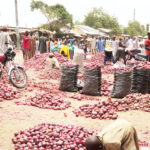Financial experts have urged the Central Bank of Nigeria (CBN) to stabilise the foreign exchange for the productive sector and sustain its interventions to curb inflation.
They said this in an interview with the News Agency of Nigeria (NAN) in Lagos on Saturday.
- PODCAST: The Weird Things Nigerians Do For Drugs
- Jos crisis: Govt dispels review of 6pm to 6am curfew
Sheriffdeen Tella, a Professor of Economics at the Olabisi Onabanjo University Ago-Iwoye, Ogun, said the apex bank must ensure that foreign exchange was available always for domestic producers.
“Making it easily available for businesses locally is crucial because our economy is an import dependent one.
“Inadequate foreign exchange will result to most times high inflation leading to exorbitant commodities,” Tella said.
He noted the Federal Government should improve the security situation in many farm settlements in order to boost food output.
“Entrenched peace and security is needed for farmers to cultivate, particularly now that the rains are here.
“Having a good security climate is crucial to achieve a better harvest and the food induced inflation will abate,” he said.
Also, Dr Bright Eregha, who lectures Economics at the Pan Atlantic University, Lagos, said the inflation would dip with the CBN various interventions.
“The apex bank intervention especially the Anchor Borrowers’ scheme if sustained over time will lead to food security.
“As this policy will drive economic growth and create employment opportunities for the teaming youth,” Eregha said.
He noted the Federal Government should tackle the logistical headwinds because it is one of the factors triggering rise in inflation.
The National Bureau of Statistics (NBS) in its Consumer Price Index said headline inflation dropped to 17.38 percent in July.
This was 0.37 per cent lower than when compared with 17.75 per cent achieved in June.
Similarly, in July, the food index fell by 0.80 basis point to 21.03 per cent from 21.83 per cent in June. (NAN)

 Join Daily Trust WhatsApp Community For Quick Access To News and Happenings Around You.
Join Daily Trust WhatsApp Community For Quick Access To News and Happenings Around You.


